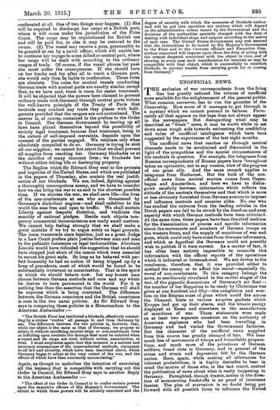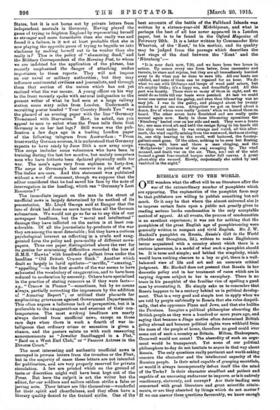UNOFFICIAL NEWS.
THE exclusionof war correspondents from the firing L.
line has greatly reduced the volume of unofficial news available for the enlightenment of the general public. What remains, moreover, has to run the gauntlet of the Censorship.- How some of it manages to get through is a mystery which we cannot pretend to fathom. Fortu- nately all that appears on the tape does not always appear in the newspapers. But disregarding what may be described as " freak " news, it may be worth while to set down some rough aide towards estimating the credibility and value of unofficial' intelligence which have been suggested by the experiences of the last eight months.
The unofficial news that reaches us through neutral channels needs to be scrutinized and discounted in the light of the sympathies and the special circumstances of
the neutrals in question. For example, the telegrams from Russian correspondents of Roman papers have .hroughout
taken an optimistic, not to say roseate. view of the progress of our great ally. And the same remark applies to telegrams from Bucharest. But the bulk of the non- official news from neutral sources comes from Copen- hagen and Amsterdam, and here we have to distin- guish carefully between information which reflects the attitude of the neutrals themselves and that which is more or less obviously furnished from German sources to impress and influence neutrals and enemies alike. No one who has studied the extracts from the leading articles in the Dutch papers can fail to be struck by the freedom and even asperity with which German methods have been criticised. At the same time, these papers have been the chief medium for the dissemination of precise and specific information about the movements and numbers of German troop. on the western front, and the supply of munitions of war and guns, which could only have come from German informants,
and which ea hypothesi the Germans could not possibly wish to publish if it were correct. As a matter of fact, it
has often been entirely impossible to reconcile this information with the official reports of the operations which it indicated or foreshadowed. We are driven to the
conclusion, therefore, that it was provided either to mislead the enemy or to affect his moral—especially th, moral of non-combatants. To this category belongs the news, so assiduously circulated in the earlier stages of the war, of the gigantic dimensions of Germany's air fleet— the number of her Zeppelins to be ready by Christmas was given at one hundred and fifty—the completion and erec-
thin on the Belgian coast of guns which could fire across the Channel, hints at various surprise packet. which Krupps had got up their sleeve, and the titanic energy displayed at Essen and elsewhere in the manufacture of munitions of war. Those statements were made on at least two separate occasions on the authority of American engineers who bad been travelling in Germany and had visited the Government factories. But the character of the unofficial news supplied from this source has greatly changed of late. We hear much less of movements of troops and formidable prepara- tions, and much more of the privations of German soldiers, broad riots in Germany, and in general of the stress and strain and depression felt by the German
nation. Here, again, while making all allowances for inherent probabilittea, it is highly desirable to bear in mind the motive of those who, in the last resort, control
the publication of news about what is really happening in Germany. Farsighted, though drastic, action in the direc- tion of economizing foodstuffs is no proof of imminent famine. The plea of starvation is no doubt being put forward with all possible force to influence the United
States, but it is not borne out by private letters from independent neutrals in Germany. Having played the game of trying to frighten England by representing herself as stronger and more formidable than she really was and found it a failure, is it not at least probable that she is now playing the opposite game of trying to beguile us into slackness by making herself out to be weaker than she really is ? This is the policy of "shamming dead," and the Military Correspondent of the Morning Post, to whom we are indebted for the application of the phrase, has recently emphasized the danger of attaching undue importance. to these reports. They will not impose on our naval or military authorities ; but they may influence sentimental civilians and journalists, and through them that section of the nation which has not yet realized what the war means. A young officer on his way to the front recently spoke with natural indignation to the present writer of what he had seen at a large railway station some sixty miles from London. Underneath 'a recruiting poster beaded " Your Country Needs You " was the placard of an eveniug paper with the line "Germany Threatened with Starvation. How, he asked, can you appeal to tueu to enlist when the Press tells Mann that Germany is on her last legs ? Still worse was the pub- lication a few days ago in a leading London paper of the following telegram from Amsterdam " From trustworthy German sources, it is understood that Germany expects to ban; ready by June 26th a new army corps. This corps includes some volunteers who have been in training during the last few mouths, but mainly comprises men who have hitherto been declared physically unfit for war. The rueu's ages vary from eighteen to forty-five. The corps is Gera/tang's last resource in point of men." The italics are ours. And this statement was published without a word of comment, though we suppose that the editor considered that he had saved his face by the note of interrogattuu in the heading, which ran " Germany's Last Resource? "
The immediate impact on the man in the street of unofficial news is largely determined by the method of its presentation. Mr. Lloyd George said at Bangor that the lure of drink had Joao us more harm than all the German submarines. We would not go so fax as to say this of our newspaper headlines, but the " moral and intellectual " damage they have inflicted on the nation is at least con- siderable. Of all the journalistic by-products of the war they are among the most detestable ; but they have a curious psychological interest as reflecting in a crude and exag- gerated form this policy and personality of different news- papers. Thus one paper_ distinguished above the rest for its genius for minimizing difficulties recorded the loss of
H.M.S. • HAM with hundreds of gallant lives under the headline " Old British Cruiser Sunk." Another which dealt so largely in lurid epithets—" terrific," "amazing," " appalling '—iu the first mouths of the war seems to have exhausted the vocabulary of exaggeration. and to have been reduced to moderation by necessity. Others have specialized in the practice of stating rumours as if they were facts- " Cracow in Plaines "—sometimes, but by no means always, partially correcting the impression by the addition of "Amazing Report "; or utilized their placards for emphasizing grievances against Government Departments. This often argues a ludicrous lack of perspective, bnt it is preferable to the exaggerations and evasions of their con- temporaries. The most striking • headlines are nearly always derived froni unofficial news, except on those rare days when there is such a dearth of war in- telligence that ordinary crime or sensation is given a chance, and the posters salute us with such reassuring announcements as "Jeweller Sandbagged in a Flat," "Raid ou a West End Club," or "Famous Actress in the Divorce Court."
The most interesting and authentic unofficial news is oouveyed in private letters from the trenches or the Fleet, but in the majority of cases these letters are not intended for publication, and are very properly reserved for private circulation. A few are printed which ou the ground of taste or discretion might well have been kept out of the Prose. But here the culprit is not the writer but the editor, for our soldiers and. sailors seldom strike a false or jarring note. .Their letters are like theruselvee—wonderful for their .spirit and cheerfuinesi, and they often have a literary quality denied to the trained scribe. One of the best accounts of the battle of the Falkland Islands was written by a sixteen-year-old Midshipman, and what is perhaps the beet of all has never appeared in a London paper, but is to be found in the Oxford Magazine of February 26th. It is a letter written by Commander Erie Wharton, of the Kent,' to his mother, and its quality may be judged from the passage which describes the last stage of the duel between the 'Kent' and the • Niirn berg':— " It is near dusk now, 120, and we have been two hours in action. Up comes every one from below, from casemates and turrets, to stare and rejoice, but they are all immediately hustled away to do what can be done to save life. All our boats are riddled, and none of them can bo repaired for an hour. We do what Ivo tan with lifobuoys and lumps of wood paid astern, but it's mighty little ; it's a loppY Sea, and dreadfully cold. All this part was beastly. There were no many of them in sight, and we could do so little till our boats were patched. At last we could lower one cutter and the galley, and even then life-saving was no easy job. I was in the galley, and plunged about for twenty minutes to get one man. Altogether wo got on board about a dozen, live of whom were really 'goners' when we heisted them on band. The other seven have flourished and are malty quite nonnal again now. Early, in theca life-saving operations the • Nurnberg' heeled over on her side and mot. They were a brave lot; one man stood aft and held the ensign flying in his hands till the ship want under. It was strange and weird, all this after- math, the wind rapidly arising from the westward, darkness closing in, one ship heaving to the swell, well bettered, the foretop- gallant-meat gone. Of the other, nothing to bo seen but floating wreckage, with bore and there a man clinging, and the • hdollyhawirs • (vultures of the sea) swooping by. The wind moaned, and death was on the air. Then, see! out of the mist loomed a great four-mastod barque under full canvas. A great ghost-ship she seemed. Slowly, majestically she sailed by and vanished in the night"







































 Previous page
Previous page